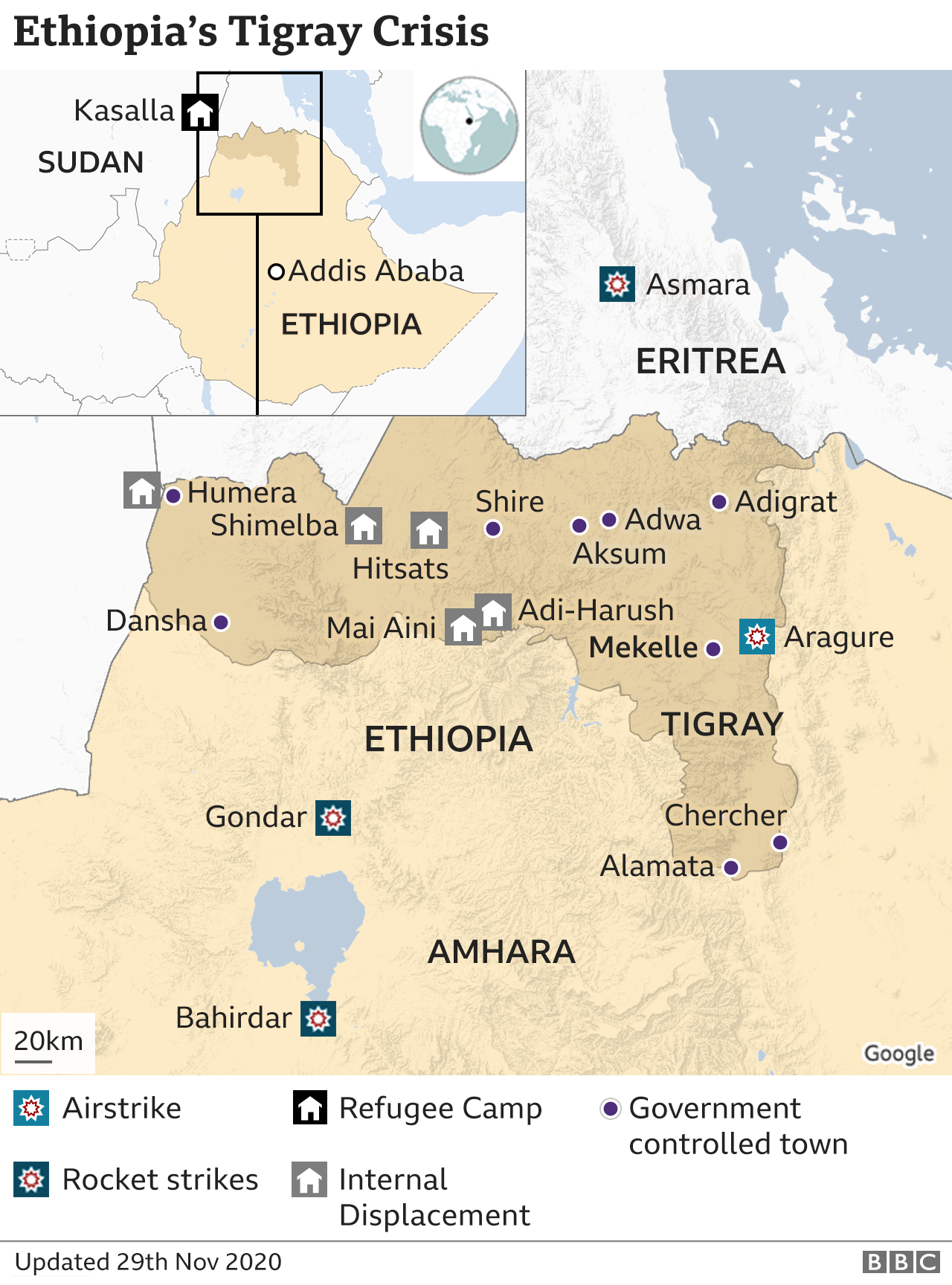The main hospital in the capital of Ethiopia's northern region of Tigray is "dangerously low" on supplies as it treats the wounded from the fighting around the city, the Red Cross says.
On Saturday, Prime Minister Abiy Ahmed had said that federal forces had taken control of the city.
He described it as the "last phase" in the three-week long fight with the Tigray People's Liberation Front.
But the TPLF leader vowed to fight on, in a statement to Reuters.
Few details have emerged from Tigray throughout the fighting as communications have been cut.
The statement from the International Committee of the Red Cross (ICRC) provides a rare insight into events on the ground during the conflict - in which hundreds have reportedly died and tens of thousands have fled their homes.
What does the Red Cross say?
The ICRC said the Ethiopian Red Cross ambulances had taken "injured and deceased people" to the Ayder Referral Hospital.
On a visit to the hospital, ICRC staff found "80% of patients to be suffering from trauma injuries" adding that other services had to be suspended "so that limited staff and resources could be devoted to emergency medical care".
"The hospital is running dangerously low on sutures, antibiotics, anticoagulants, painkillers, and even gloves," ICRC head in Ethiopia Maria Soledad said.
The situation in Mekelle today is quiet and we hope that we will be able to get urgently needed assistance into the city soon. Red Cross ambulances have thus far been able to move around and transport injured and deceased. pic.twitter.com/07XxGYUnRf
— ICRC Africa (@ICRC_Africa) November 29, 2020

The hospital is also running low on body bags for the deceased, the Geneva-based organisation said.
The ICRC, however, did not give any figures for the numbers injured or dead. Neither did it say whether the victims were civilians or military personnel.
What does the government say?
In a statement on Twitter on Saturday, Mr Abiy said the army was in full control of Mekelle and that this "marks the completion of the [military's] last phase".
"I am pleased to share that we have completed and ceased the military operations in the Tigray region," he said.
He added that the army had released thousands of soldiers taken by the TPLF and was in control of the airport and regional offices, saying that the operation had been carried out with "due care for citizens".
The prime minister has consistently described the TPLF leadership as a "criminal clique" and said that the police will "bring them to the court of law".


How has the TPLF responded?
In a text message to Reuters, TPLF leader Debretsion Gebremichael did not directly comment on the situation on the ground, but said of the government forces: "Their brutality can only add [to] our resolve to fight these invaders to the last."
He added: "This is about defending our right to self-determination."
Mr Debretsion's whereabouts are unknown.
A TPLF statement read out on regional Tigray TV said: "Fascistic bombings have caused civilian deaths and injuries. The Tigray government has vowed that it would take retaliatory actions against the barbaric bombings".
Analysts say the TPLF could now be preparing to return to the mountains to launch a guerrilla war against the federal government.
What are the humanitarian concerns?
The UN had warned of possible war crimes if the Ethiopian army attacked Mekelle.
It has also expressed concerns about the lack of access for humanitarian workers.
The Ethiopian authorities said on Thursday that "a humanitarian access route" overseen by the government would be opened, adding they were "committed to work with UN agencies... to protect civilians and those who need it".
Also on Thursday, Ethiopian troops were deployed along Tigray's border with Sudan, preventing people fleeing the violence from leaving the country, according to refugees.
In an update released on Saturday, the UN said that more than 40,000 Ethiopians had crossed over since the fighting began in early November.
Ethiopia's state-appointed Human Rights Commission has accused a Tigrayan youth group of being behind a massacre this month in which it says more than 600 non-Tigrayan civilians in the town of Mai-Kadra were killed. The TPLF denied involvement.
In a meeting on Friday, Mr Abiy told African peace envoys that civilians would be protected.
Who are the TPLF?
The TPLF fighters, drawn mostly from a paramilitary unit and a well-drilled local militia, are thought to number about 250,000.
The organisation was founded in the 1970s and spearheaded the uprising against Marxist dictator Mengistu Haile Mariam, who was toppled in 1991.
It then went on to be the dominant political force in the country until Mr Abiy became prime minister in 2018.
Mr Debretsion has said the Tigray forces were "ready to die in defence of our right to administer our region".
What is the fighting about?
The conflict is rooted in longstanding tension between Ethiopia's government and the TPLF, sparked by Mr Abiy's moves to sideline the party.
When Mr Abiy postponed a national election because of coronavirus in June, relations further deteriorated.
The TPLF said the government's mandate to rule had expired, arguing that Mr Abiy had not been tested in a national election.
In September the party held its own election, which the government said was "illegal".
In early November, TPLF fighters entered a military base in Mekelle which led to the start of the federal army's operation in Tigray.

Find out more about the Tigray crisis:
https://news.google.com/__i/rss/rd/articles/CBMiMGh0dHBzOi8vd3d3LmJiYy5jby51ay9uZXdzL3dvcmxkLWFmcmljYS01NTEyMDU3MtIBNGh0dHBzOi8vd3d3LmJiYy5jby51ay9uZXdzL2FtcC93b3JsZC1hZnJpY2EtNTUxMjA1NzI?oc=5
2020-11-29 16:40:00Z
52781211807328
Tidak ada komentar:
Posting Komentar